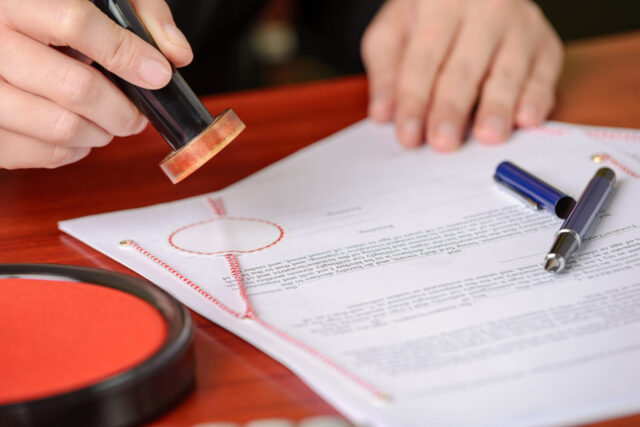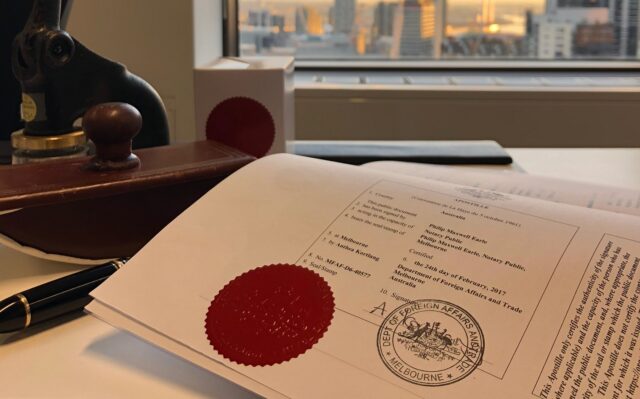

Navigating the bureaucratic process of document authentication can be daunting, especially when it involves international recognition. In Illinois, like many other states, this process is streamlined through the use of an Apostille. An Apostille is a specialized certificate that verifies the authenticity of a document, allowing it to be recognized in countries outside of the United States. This is particularly crucial for individuals and businesses that have dealings overseas, ensuring that their Illinois-issued documents are valid and accepted internationally. In this guide, we will provide a comprehensive overview of the Apostille process in Illinois, shedding light on its significance and detailing the steps involved.

The concept of an Apostille might be unfamiliar to many, but its role in international documentation is paramount. Established by the Hague Convention of 1961, the Apostille serves as a standardized method of authenticating documents for use in foreign countries that are members of the Convention. Essentially, it acts as a bridge, ensuring that documents issued in one country are recognized and accepted in another, eliminating the need for further authentication or legalization by the embassy or consulate of the foreign country. In the context of Illinois, an Apostille verifies that the document in question has been issued by a recognized authority in the state and that any signature on the document is genuine. This process ensures that Illinois-issued documents, whether they are birth certificates, diplomas, or legal papers, are readily accepted in other countries without any hassles.
When it comes to obtaining an Apostille in Illinois, it’s crucial to ensure that the document in question meets specific requirements. Firstly, the document must be issued within the state of Illinois. This means that it should either be an original or a certified copy that has been issued by an Illinois State or County official. For instance, vital records, such as birth or marriage certificates, need to be certified by the county clerk or issued by the local registrar at the Illinois Department of Public Health. On the other hand, for a marriage license, a certified copy from the county clerk will suffice.
Divorce certificates present another layer of complexity. To be eligible for an apostille, they need to be certified by the clerk of the Circuit Court. Academic records and documents, such as diplomas or transcripts, must be officially issued by the school registrar’s office. These documents should be signed by a school official and properly notarized, complete with the notary’s signature, rubber stamp, and an acknowledgment statement.
Corporate business documents, such as trademark registrations, merger certificates, and other business organization documents filed at the Illinois Secretary of State, also need to be notarized to be eligible for an apostille. Additionally, private documents like adoption dossiers and deeds can be submitted for an apostille, provided they are notarized as accurate copies of the original documents. If you can’t do it on your own, it’s best to hire an apostille service in Illinois.

The Illinois Secretary of State plays a pivotal role in the apostille process. They are the designated authority responsible for issuing apostilles for documents originating from Illinois. When you’re looking to get an apostille, it’s essential to get in touch with the Illinois Secretary of State and follow their exact process. This ensures that your apostille is filled out correctly, minimizing the risk of it being rejected by the foreign country you are sending it to.
One of the main requirements is that the apostille must be obtained by the Secretary of State. This emphasizes the importance of the document being notarized and authenticated by the appropriate authority. An apostille is a sensitive document that must comply with the 1961 Hague Convention Treaty to be accepted. This means that all seals and signatures on the document must be original. If your documents are in a foreign language, they must be translated into English by a certified translator and then notarized as a true translation.
Before obtaining an apostille, it’s imperative to have your document notarized. Notarization is a process where a commissioned notary public verifies the authenticity of a document, the identity of the signer, and witnesses the signing of the document. In the context of the apostille process in Illinois, notarization serves as a preliminary step to ensure that the document is genuine and has been signed by the rightful individual or authority.
For documents like academic records, they must be officially issued by the school registrar’s office, signed by a school official, and then notarized. This includes having the notary’s signature, an affixed rubber stamp, and an acknowledgment statement on the document. Similarly, corporate business documents filed at the Illinois Secretary of State need to be notarized to be eligible for an apostille.

To secure an apostille in Illinois, follow these streamlined steps:
Document Verification: Ensure you have the correct document that needs apostilling.
Contact the Secretary of State: Reach out to the Illinois Secretary of State’s office for their apostille services. They’ll provide the necessary forms and guidance.
Form Completion: Fill out the forms diligently, ensuring all details are accurate.
Submission: Submit your application with the required supporting documents and the appropriate fees.
Await Processing: The Illinois Secretary of State’s office will then process your request. Ensure all steps are followed correctly for the apostille to be valid internationally.
Obtaining an apostille in Illinois comes with a fee, typically around $2 per document for standard processing. While this is the general cost, it’s always a good idea to check the latest fees with the Secretary of State’s office. The processing time can vary, but with all the correct documentation, it’s usually a swift process. Expedited services might be available for an additional fee.

Various documents might require an apostille for international use. Some of the most common ones include:
Vital Records: Birth certificates, marriage certificates, and death certificates.
Legal Documents: Divorce decrees, court orders, and affidavits.
Academic Records: Diplomas, transcripts, and other educational credentials.
Business Documents: Trademark registrations, merger certificates, and other official business documents.
Navigating the process of obtaining an apostille in Illinois might seem complex, but with the right guidance and understanding of the procedure, it becomes manageable. Ensuring that your documents are correctly notarized and authenticated is the key to a smooth apostille process. By following the steps outlined and understanding the significance of each stage, you can ensure that your Illinois-issued documents are recognized and valid internationally.